Turtle swept 4,000 miles to Wales flies home to Texas
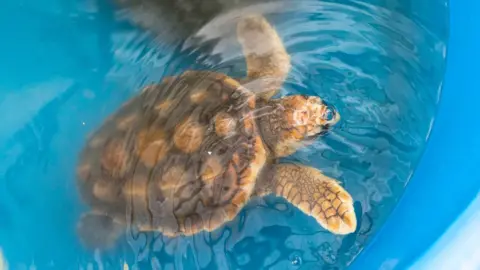 RAF Valley
RAF ValleyOne of the world's rarest turtles is returning home to Texas after washing up 4,000 miles away in north Wales.
Tally was found stranded and near death on Talacre beach, Flintshire, in 2021 but was nursed back to full health by Anglesey Sea Zoo.
Turtles Fly Too, one group involved, described the flight to the US as its "furthest and most complex mission".
Tally is a Kemp's ridley turtle, a species mainly found in the Gulf of Mexico and off eastern North America.
But young Kemp's ridley turtles can sometimes be swept across the Atlantic by the Gulf Stream.
Tally will be released from Galveston, Texas, into the Gulf of Mexico in September for what the US Fish and Wildlife Service called "a second chance at life".
After washing up in north Wales, Tally was spotted by a dog walker and reported to the British Divers' Marine Life Rescue (BDMLR).
Biologists from Anglesey Sea Zoo soon realised the turtle was still alive and provided months of intensive care until she was healthy again.
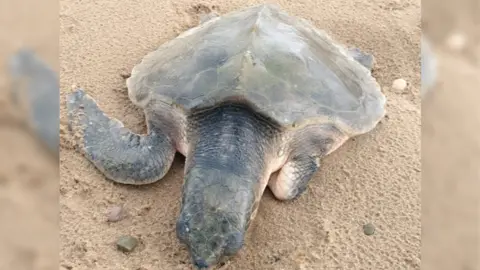 Ashley James
Ashley James"The cold waters of the north east Atlantic usually result in certain death for this species of subtropical sea turtle in the winter," said Mary Kay Skoruppa, the US Fish and Wildlife Service's Texas sea turtle coordinator.
"But thanks to the quick response of a great group of international partners and volunteers, Tally is alive and ready to come home."
Gem Simmons, BDMLR North Wales Rescue Coordinator, was one of the first people to see Tally when she washed up.
"To our surprise she was not only alive, but also one of the most endangered species in the world," she said.
"None of us gave her a chance to survive."
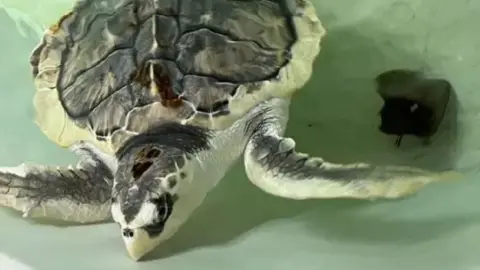 Anglesey Sea Zoo
Anglesey Sea ZooGem said she was thrilled that the sea turtle was finally able to "go back to her world".
However, she does expect these occurrences to become more frequent due to "increasing threats" to oceans.
"Last winter, while Tally was recuperating, there were nearly 20 turtles that washed up. The rise has been pretty sharp," she said.
"In the UK we are in the process of developing a network where we can get them back in the wild in particular."
How do you transport a turtle between continents?
Flying an endangered sea turtle across continents is a complex operation.
The Convention on International Trade in Endangered Species of Wild Fauna and Flora (CITES) is an international agreement between governments.
Its aim is to ensure that international trade in specimens of wild animals and plants does not threaten the survival of the species.
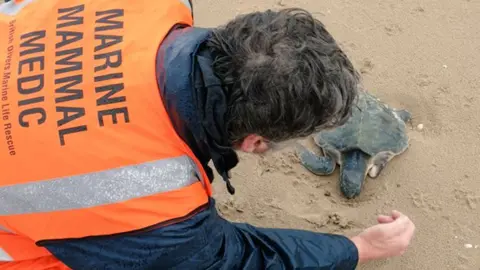 Ashley James
Ashley JamesOn arrival in the US, Tally will be transferred to Houston Zoo, where veterinarians will ensure she is healthy enough to be released into the wild.
If approved, researchers will attach a tracking device to monitor her movements after release.
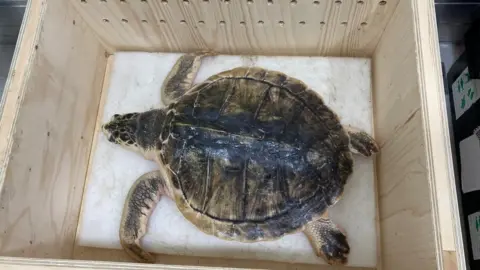 Anglesey Sea Zoo
Anglesey Sea ZooAn international team of partners will meet in Galveston to celebrate Tally's release.
"An endangered species is one that is at risk of extinction in the near future, so every individual counts," said Ms Skoruppa.
"We hope that Tally will grow to maturity and return to nest on a Texas beach in a few years to help ensure her species' survival into the future."
What to do if you find a sick or endangered sea turtle
Co-ordinator at Marine Environmental Monitoring Rod Penrose said:
"Immediately report the turtle to the. Marine turtles will drown if trapped under water, but prompt action can save them."
"A turtle that is entangled or trapped ins likely to be stressed. Large turtles deliver a serious bite and a blow from a flipper can be painful, so be careful."
"Due to possible health risks involved in handling turtles, always wear rubber gloves."
What is a Kemp's ridley turtle?
- Kemp's ridleys are among the rarest of all the marine turtles and were close to extinction in the 1980s
- They have an almost completely round carapace, or shell, about 70cm (2ft 3in) long, and they weigh approximately 40kg (88lb)
- They feed on a wide variety of foods, including crustaceans and seaweed

- PARANORMAL: Chilling ghost stories and words appearing on the walls...
- UNMISSABLE DRAMA: When the Wolf is at the door, be very afraid

